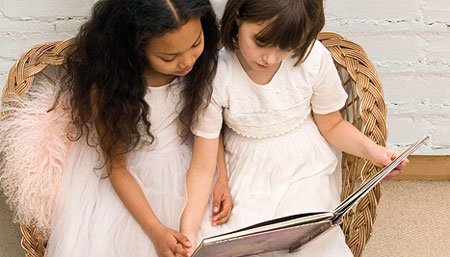Spare a few moments and read out a story to your little one. You will be surprised at the benefits it can offer. Everyone loves a story. As a parent you may have heard many a "Tell me a story, please". As a teacher you may have had children eagerly awaiting story-time. A story transports you to a world of make believe. Can you forget your childs expression when he slips under the covers as the lion waits to pounce on the rabbit? In this articleAttentionMoralsKnowledgeSpeechReadingProblem solvingClarity of thoughtMemoriesBenefits of storytelling Attention Children have short attention spans. Telling them stories improves their attention span and listening skills. After all, there is nothing more annoying than a person who tunes off when others are talking, and has a very short attention span. Morals Many stories for children come with a moral at the end. Stories are an interesting way of instilling values in children. You can tell a child that it is always good to be honest, but if you tell him a story that encompasses the advantages of honesty, your child will get the message much more clearly, and chances are, he will remember it for longer as well. Knowledge Stories are probably one of the best learning tools there is. Your child can learn so much through stories. A story can be a great tool for teaching your child about different parts of the world, their cultures, landscape, weather and so on. Your child may have never seen snow, but describing white Christmases and snowstorms helps him experience and enjoy snow vicariously. Similarly, your child can learns about moors and marshes, lagoons, forests and jungles, all without stepping out from his flat in Bombay. Speech Stories improve oral skills as children try to repeat stories. You can introduce your child to new words constantly when reading out stories to him. This helps build his vocabulary. Reading Listening to audio renditions of a story encourages children to follow the printed word in their books as they read along with the audio. Alternatively, you can read along with your child, to help him identify words quickly. Problem solving Storytelling also improves problem solving skills and inventive thinking as children discover solutions to problems in their story. For example, when someone is locked in a room, they may find an ingenious way to escape. This prompts your child to think of other avenues, and put the wheels of his brain in motion. His imagination soars, and creativity skills get sharpened. Clarity of thought Encourage your children to tell you stories as well. As they repeat a story, they learn to sequence events and jog their memories to recall incidents in the story. This lays a firm foundation for later as they study more complex subject matters. They also learn to express themselves better. Memories We all have memorable experiences of hearing stories from our grandmothers. Such memories last a lifetime, and can be a source of great comfort in your childs later years.
Spare a few moments and read out a story to your little one. You will be surprised at the benefits it can offer. Everyone loves a story. As a parent you may have heard many a "Tell me a story, please". As a teacher you may have had children eagerly awaiting story-time. A story transports you to a world of make believe. Can you forget your child's expression when he slips under the covers as the lion waits to pounce on the rabbit?
Benefits of storytelling
Attention
Children have short attention spans. Telling them stories improves their attention span and listening skills. After all, there is nothing more annoying than a person who tunes off when others are talking, and has a very short attention span.
Morals
Many stories for children come with a moral at the end. Stories are an interesting way of instilling values in children. You can tell a child that it is always good to be honest, but if you tell him a story that encompasses the advantages of honesty, your child will get the message much more clearly, and chances are, he will remember it for longer as well.
Knowledge
Stories are probably one of the best learning tools there is. Your child can learn so much through stories. A story can be a great tool for teaching your child about different parts of the world, their cultures, landscape, weather and so on. Your child may have never seen snow, but describing white Christmases and snowstorms helps him experience and enjoy snow vicariously. Similarly, your child can learns about moors and marshes, lagoons, forests and jungles, all without stepping out from his flat in Bombay.
Speech
Stories improve oral skills as children try to repeat stories. You can introduce your child to new words constantly when reading out stories to him. This helps build his vocabulary.
Reading
Listening to audio renditions of a story encourages children to follow the printed word in their books as they read along with the audio. Alternatively, you can read along with your child, to help him identify words quickly.
Problem solving
Storytelling also improves problem solving skills and inventive thinking as children discover solutions to problems in their story. For example, when someone is locked in a room, they may find an ingenious way to escape. This prompts your child to think of other avenues, and put the wheels of his brain in motion. His imagination soars, and creativity skills get sharpened.
Clarity of thought
Encourage your children to tell you stories as well. As they repeat a story, they learn to sequence events and jog their memories to recall incidents in the story. This lays a firm foundation for later as they study more complex subject matters. They also learn to express themselves better.
Memories
We all have memorable experiences of hearing stories from our grandmothers. Such memories last a lifetime, and can be a source of great comfort in your child's later years.































